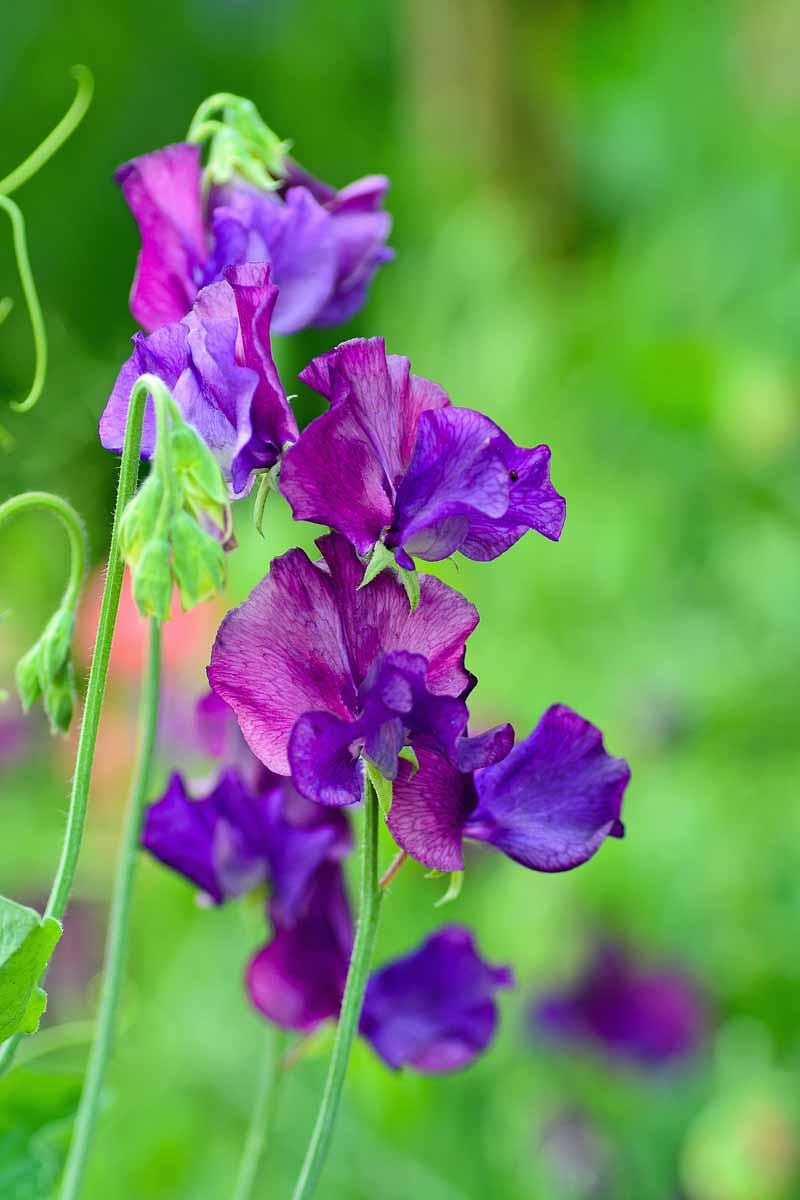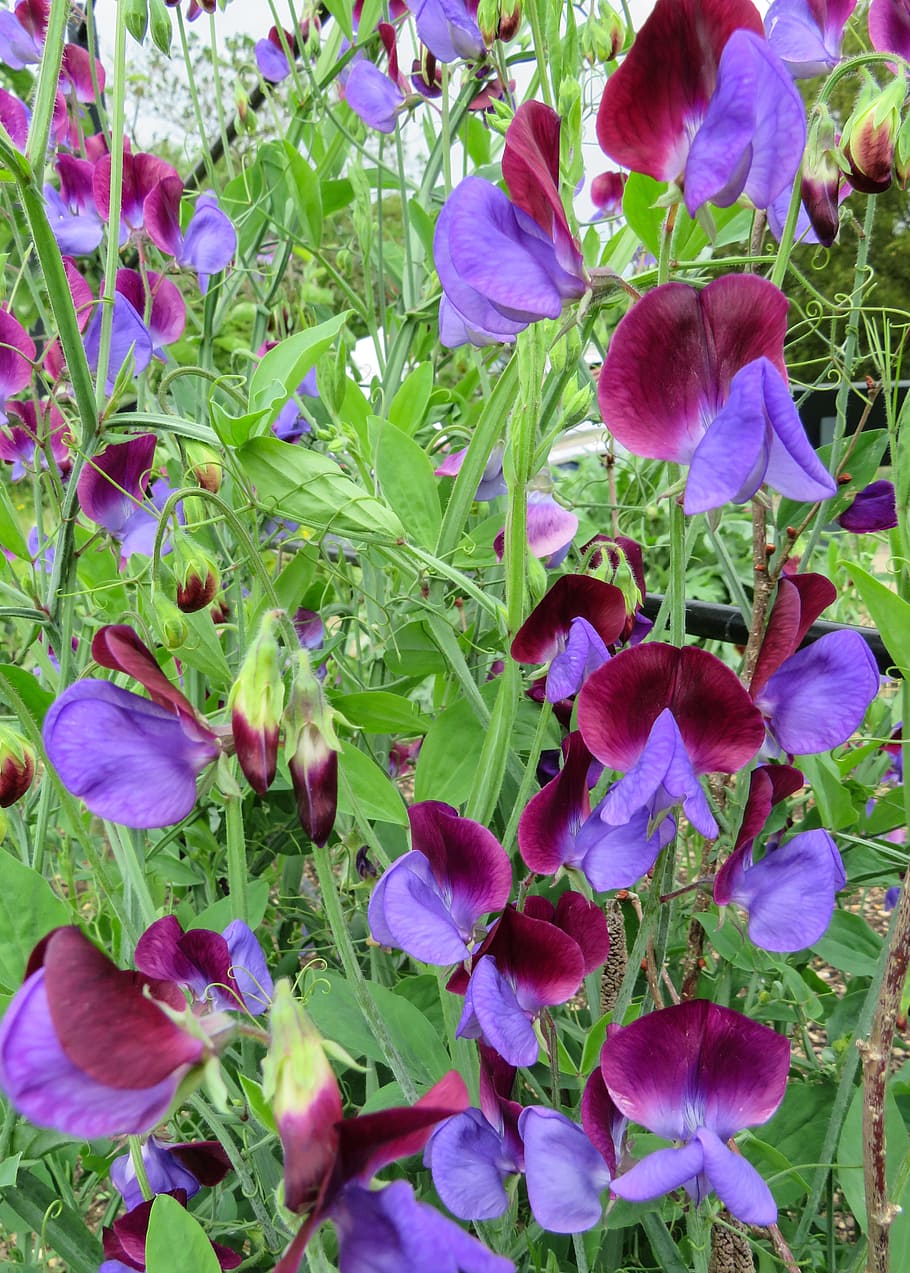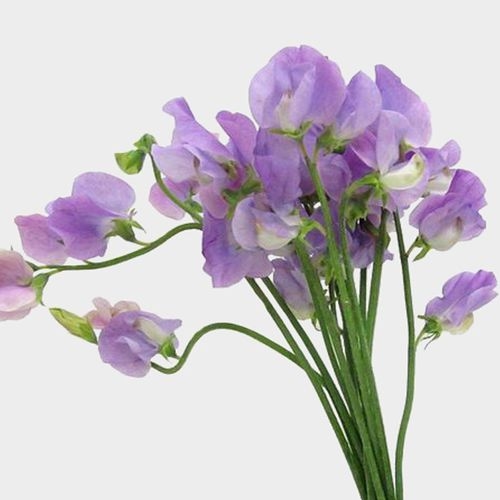
Bulk Sweet Pea Seeds Purple Mix Bulk Wildflowers
Cover the seeds with a thin layer of soil and moisten it gently. Providing Optimal Conditions: Purple sweet pea seeds require specific conditions for germination. Keep the soil consistently moist but not waterlogged, and place the containers in a warm location with temperatures around 60-70°F (15-21°C).

Dark Purple Designer Sweet Pea Flower
Lathyrus odoratus 'Pandemonium' is a flake sweet pea, meaning its flowers have a pale background with a darker shade striped or 'flaked' over it. A Spencer-type, its dark pink flaked flowers are large and wavy edged, on strong stems. Dark-pink and white striped/flaked Lathyrus odoratus 'Pandemonium'. 9.
:max_bytes(150000):strip_icc()/GettyImages-1221009479-73c4e5493fe64282b747584815308ca7.jpg)
Sweet Peas Plant Care & Growing Guide
Seeds. The sweet pea, Lathyrus odoratus, is a flowering plant in the genus Lathyrus in the family Fabaceae (), native to Sicily, southern Italy and the Aegean Islands.. It is an annual climbing plant, growing to a height of 1-2 metres (3 ft 3 in - 6 ft 7 in), where suitable support is available. The leaves are pinnate with two leaflets and a terminal tendril, which twines around supporting.

Purple Sweet Pea Photograph by Marjorie Imbeau
How to Plant and Soil. Plant sweet peas in the late winter and early spring. Sow three seeds together about a foot between groups of seeds. Plant sweet pea seeds about 1 inch down in the soil. Work compost into the soil about six weeks before planting the seeds for better blooms. Compost will also improve poor soil.

Purple Sweet Pea (Lathyrus odoratus) Craig Jewell Flickr
12. 'Matucana'. When it comes to the best sweet pea varieties for fragrance, this stunning, bicolor Grandiflora arguably makes the top of the list. These vigorous plants produce masses of vibrant maroon and purple blooms that look simply stunning climbing over obelisks, trellises, or garden arches.

Sweet Peas in Purple Photograph by Bruce Frye
What is a Sweet Pea Bush? Unrelated to sweet pea garden flowers (Lathyrus odoratus), the sweet pea shrub (Polygalaspp.) gets its name from its similar-looking flowers. Sweet pea shrubs attract bees, butterflies, and birds, making them an excellent choice for wildlife gardens.It grows 2 to 3 feet (0.5 to 1 m.) tall and thrives in sun or shade. Native to South Africa and sensitive to frost, it.

Beautiful Purple Flower of the Sweet Pea Plant Stock Photo Image of
Soil. Sweet peas need well-draining, humus-rich soil with a neutral to alkaline pH. Mix in compost to amend your soil, if required. For best results, amend the soil in the fall before planting. Support sweet peas in the garden with netting, twine, or anchored trellises so the fast-growing vines won't pull them down.

Sweet Pea Purple Pimpernell Premier Seeds Direct
Sweet pea shrub's lovely foliage remains evergreen down to about 40 degrees Fahrenheit, and in regions that are never touched by frost, it may bloom nearly year-round with purple-pink flowers that resemble those of the sweet pea plant.It can survive in climates with temps down into the low 20s, where it will have a shorter but still impressive bloom period from midsummer into fall.

25 SWEET PEA VINE Lathyrus Odoratus / Most Fragrant Fast Etsy
With their seductive fragrance, sweet peas make great flowers for gardens and bouquets. Read our Sweet Pea Growing Guide for information on how to plant and care for sweet peas. About Sweet Peas. The sweet pea—Lathyrus odoratus—is an annual flower that is at home in a cutting garden, border garden, woodland, or twining on a trellis or an.

Sweet Pea 'Purple Pimpernel' seeds Thompson &
Product SKU: 3287. Quantity: The 'Burgundy Cast' variety of Sweet Pea dark purple flowers is a visual spectacle that commands attention. Their dramatic, almost burgundy coloration engulfs the senses, reminiscent of a twilight sky. Every bloom is a testament to nature's palette, showcasing an interplay of deep purple shades that captivate and charm.

The basic things you need to learn in growing Sweet Peas Dig It Right
Award-winner Lathyrus latifolius, commonly known as Everlasting Pea or Perennial Sweet Pea is a vigorous climbing perennial that produces racemes of 5-11 vibrant rose to white pea-like flowers, 1 in. across (2.5 cm). Blooming all summer, if not allowed to go to seed, the attractive blossoms are borne on winged stems clad with paired, blue-green leaflets bearing tendrils.

Sweet Pea Flower Pretty · Free photo on Pixabay
Looking for Sweet Pea Purple? We have almost everything on eBay. No matter what you love, you'll find it here. Search Sweet Pea Purple and more.

Sweet, Pea, Pea, Flowers, Climbing, Purple, sweet, pea, flowers
Sweet peas bloom in almost every color except yellow, including shades of pink, red, maroon, purple, lavender, salmon, and white. Some cultivars have bicolored, streaked, or picotee-edged blooms. The flowers are borne in clusters on sturdy stems, with three to six or more flowers per stem.

Sweet Pea 'Memories' is an excellent purple with large glamorous
Tahiti Sunrise is a beautiful sweet pea vine that reaches heights of 5.5 feet. Its blooms are just under 1.5 inches and are heavily fragrant with white petals flushed with soft coral-red. Foliage is grey-green. This vigorously climbing annual is a perfect variety for climbing up trellises in the garden!

Lathyrus Sweet Pea Purple Wholesale Cut Flowers Direct
Sweet peas (Lathyrus odoratus) are prized for their old-fashioned fragrance, delicate form, and a palette ranging from the palest pinks and violets to richly saturated reds, blues, and purples.Centuries of classical plant breeding have given us diverse floral forms, including bicolor, streaked, and picotee patterns; larger, lovelier multiflora and ruffled types; and, more recently, varieties.

Purple Sweet Pea Flowers (10 Bunches) Wholesale Blooms By The Box
The annual species, L. odoratus, may be confused with the everlasting pea, L. latifolius, which is a perennial. Cultivation and History. The first written record of this plant appeared in 1695, when monk and amateur botanist Francisco Cupani noted seeing it in northwestern Sicily.